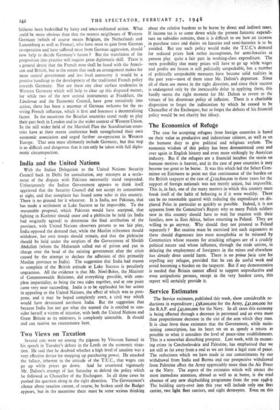India and the United Nations
With the Indian Delegation to the United Nations Security Council back in Delhi for consultation, any attempts at a settle- ment of the dispute with Pakistan necessarily stand suspended. Unfortunately the Indian Government appears to think itself aggrieved that the Security Council did not accept its contentions at sight, and that complaint has found some echo in this country. There is no ground for it whatever. It is India, not Pakistan, that has made a settlement at Lake Success so far impossible. To the reasonable proposal, which Pakistan would have accepted, that fighting in Kashmir should cease and a plebiscite be held (as India had originally agreed) to determine the final attribution of the province, with United Nations observers present to see fair play, India opposed the demand that, while the Muslim tribesmen should withdraw, her own troops should remain, and that the plebiscite should be held under the auspices of the Government of Sheikh Abdullah (whom the Maharajah called out of prison and put in charge over the head of the existing government after the crisis caused by the attempt to declare the adhesion of this primarily Muslim province to India). The suggestion that India had reason to complain of the British attitude at Lake Success is peculiarly ungracious. All the evidence is that Mr. Noel-Baker, the Minister of Commonwealth Relations, did everything possible, with com- plete impartiality, to bring the two sides together, and at one point came very near succeeding. India is to be applauded for her action in appealing to the United Nations, the effect of which was to post- pone, and it may be hoped completely avert, a civil war which would have devastated northern India. But the suggestion that because India has not got what she wanted she is entitled to con- sider herself a victim of injustice, with both the United Nations and Great Britain as its ministers, is completely untenable. It should and can receive no countenance here.


































 Previous page
Previous page